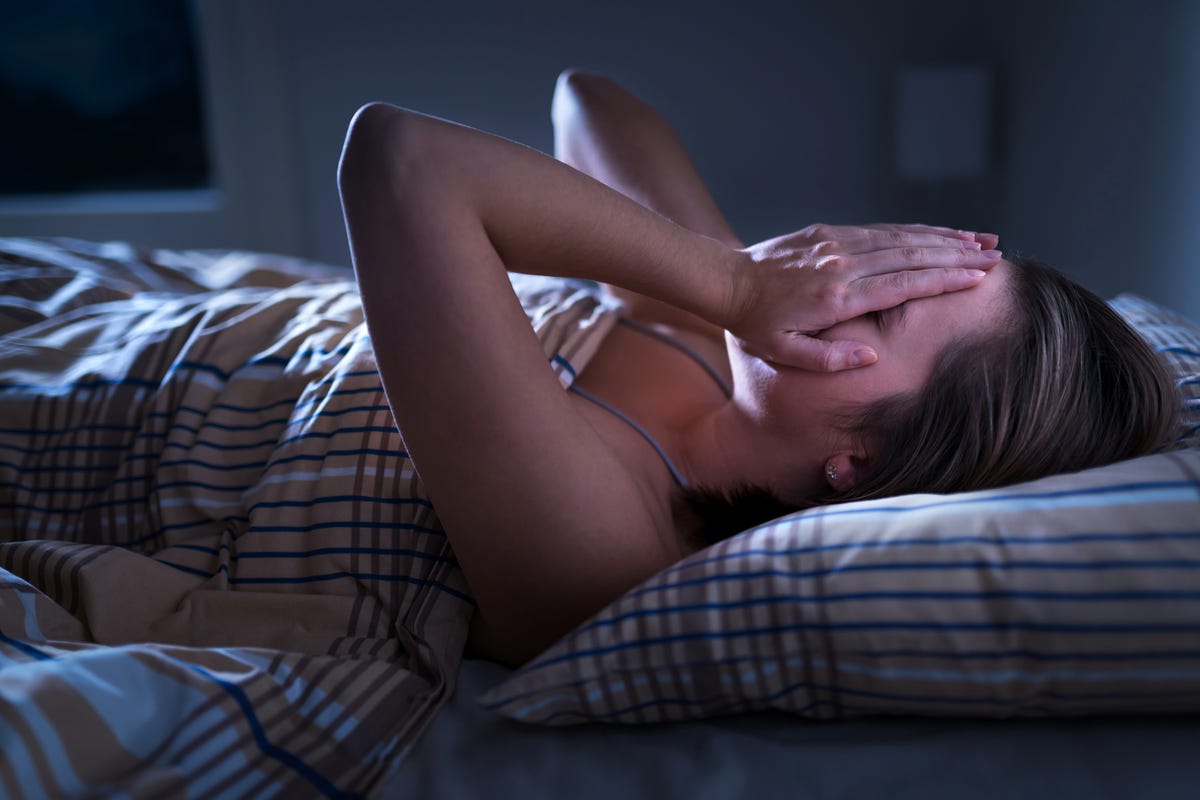
Most people know that stress and anxiety can keep them up at night. But you know that some people live with sleep anxiety, or the fear of falling asleep? Sleep anxiety can prevent you from finding restful sleep and wreak havoc on your health, potentially leading to more serious health concerns.
Fortunately, sleep anxiety is treatable. Try implementing these five tips into your nightly routine to manage sleep anxiety and get some sleep.
For more tips on dealing with sleep anxiety, check out these tips for finding an online therapist and what questions you should ask before your first appointment.
What is sleep anxiety?

Sleep anxiety is a feeling of anxiousness around falling asleep. This can be related to the actual act of falling asleep or a fear of being asleep (read on for more about that). According to the Cleveland Clinic, people who experience anxiety in other areas of their life may be more prone to sleep anxiety. Additionally, those who deal with other sleep disorders -- like restless leg syndrome and sleep apnea -- may also be more likely to experience sleep anxiety.
Sleep anxiety goes hand in hand with other anxiety and sleep disorders. If you have bipolar disorder or schizophrenia, or if you experience anxiety or depression, there's a chance that it can carry over into the nighttime, making it hard to fall asleep. Similarly, if you frequently suffer from a sleep disorder like sleep apnea, you may feel reluctant to fall asleep because of a fear of what may happen during the night.
Long-term sleep anxiety can increase your risk of health complications like diabetes, heart disease, obesity and strokes. Sleep -- and good-quality sleep, at that -- is an important part of your body's overall health.
What are the symptoms of sleep anxiety?
There are a few symptoms you might experience with sleep anxiety. Here's what to keep an eye out for.
- Fear and distress when you think about sleep
- Doing anything to avoid going to bed
- Excessive sweating before bed
- Digestive issues when you think about bedtime
- Trembling
- Increased heart rate
- Feeling tense when you get ready for bed and get into bed
- Feeling overwhelmed when bedtime is looming
- Getting irritable in the evening before bed

5 ways to cope with sleep anxiety and somniphobia
1. Improve your sleep hygiene
Sleep hygiene is your overall sleeping habits; changing this can help you find better sleep. According to the Centers for Disease Control and Prevention, to start you can set up a solid bedtime routine that you can stick to. This means setting a bedtime that's the same every night, keeping your bedroom dark and at a comfortable temperature, and keeping the bedroom for sleeping only. Try not to use devices in your bedroom before bedtime, as the light can make it harder for you to fall asleep. Essentially, you want to create a haven in your room conducive to sleep. By creating this comfortable space, your body and mind are more likely to relax at bedtime, making it easier for you to fall asleep without experiencing sleep anxiety.
2. Try to change your thinking
Something like this may be easier said than done, but there's no harm in trying. Some of the anxiety you're experiencing is simply a mind game. Try quieting those thoughts where you can. When you think it's time to panic because bedtime is looming, remind yourself that sleep is good for you, you're safe while sleeping and the morning will come in just a few hours. You could write down the things you want to remember before bed and read them aloud to yourself before bedtime as a reminder. After doing this for some time, there's a chance you could lessen your anxiety because you've allowed your brain a chance to use logic in knowing there's nothing to be afraid of while sleeping.
3. Limit caffeine and alcohol
Caffeine and alcohol in the hours leading up to bedtime can make it harder to sleep and increase anxiety. Studies show that alcohol consumption can exacerbate anxiety disorders. And while alcohol may make you sleepy, it can also amp up anxiety; it will not lend itself to quality sleep. On the flip side, caffeine, as you probably already know, prevents sleep, and consuming caffeine in the evening can make it harder to fall asleep. It's worth considering cutting both of these things out completely while you try to get your sleep anxiety under control, as neither one of them is helpful when it comes to bedtime.
4. Exercise regularly
Exercise has a proven track record for assisting with better sleep. Johns Hopkins states that the correlation between the two needs more research. However, exercise can help you sleep better for many reasons. For one, it's physically wearing you out, which means you may feel more tired when bedtime rolls around. Secondly, exercise is great for anxiety because it allows you to channel any troubling thoughts into physical activity. Research has suggested that exercising can help people deal with anxiety and bring more positivity into the day. Doing this during the day can lower anxiousness later in the day as bedtime nears.
5. Consider therapy
Sometimes therapy is the best option for dealing with sleep anxiety. A medical professional can help you work through what is causing the anxiety in the first place and come up with a treatment plan that will work for you. Some of the suggestions they might make, on a therapy front, include these three key things:
Cognitive behavioral therapy
Cognitive behavioral therapy is similar to everything we've discussed, but it's a method more closely guided by your therapist. With this method, you'll identify your hangups in terms of why you can't sleep and make changes in your routine or with your behavior to hopefully improve your sleeping habits. According to the Mayo Clinic, there are a number of techniques with CBT, and your therapist can come up with a plan best for you.
Exposure therapy
With exposure therapy, you're facing your fear head on with the help of your therapist. Together you'll look at the fear and handle it directly. According to the Cleveland Clinic, this might mean imagining sleeping and working your way up to taking short naps until eventually you can handle a comfortable night of sleep.
Medication
There is a chance that your therapist might recommend medication to help you sleep. For these more serious sleep anxiety disorders, you might get a prescription for an anxiety medication that will target that aspect of the disorder, rather than the sleeping part, according to the Cleveland Clinic. However, your therapist might prescribe something to help you sleep as well. Again, this is something that you and your therapist can discuss and figure out together.
For more help with improving your sleeping routine and dealing with anxiety, try these tips for improving your mental health without calling on a therapist or affordable therapy options that don't require insurance.
What is somniphobia?
Somniphobia is a fear of sleeping. This is more serious than sleep anxiety because it's a true fear. As with many serious anxiety disorders and phobias, somniphobia can affect your whole life and wellbeing, according to the Anxiety & Depression Association of America. With this phobia, people are often afraid of being asleep, typically because they're afraid of what will happen to them while sleeping.
Symptoms of somniphobia are similar to general sleep anxiety, but they may be more intense. People commonly experience:
- Panic at the thought of going to bed
- Sweating
- Trembling
- Heart palpitations
- Thinking and worrying about sleep throughout the day
- Avoiding sleep
- Tightness in your chest and labored breathing
Somniphobia is often a result of serious sleep disorders, like sleep paralysis or night terrors, that can make people afraid to be asleep. As with sleep anxiety, the risks associated with this sleep disorder extend into your general health and well-being because sleep is crucial to staying healthy.
The information contained in this article is for educational and informational purposes only and is not intended as health or medical advice. Always consult a physician or other qualified health provider regarding any questions you may have about a medical condition or health objectives.









 Add Category
Add Category